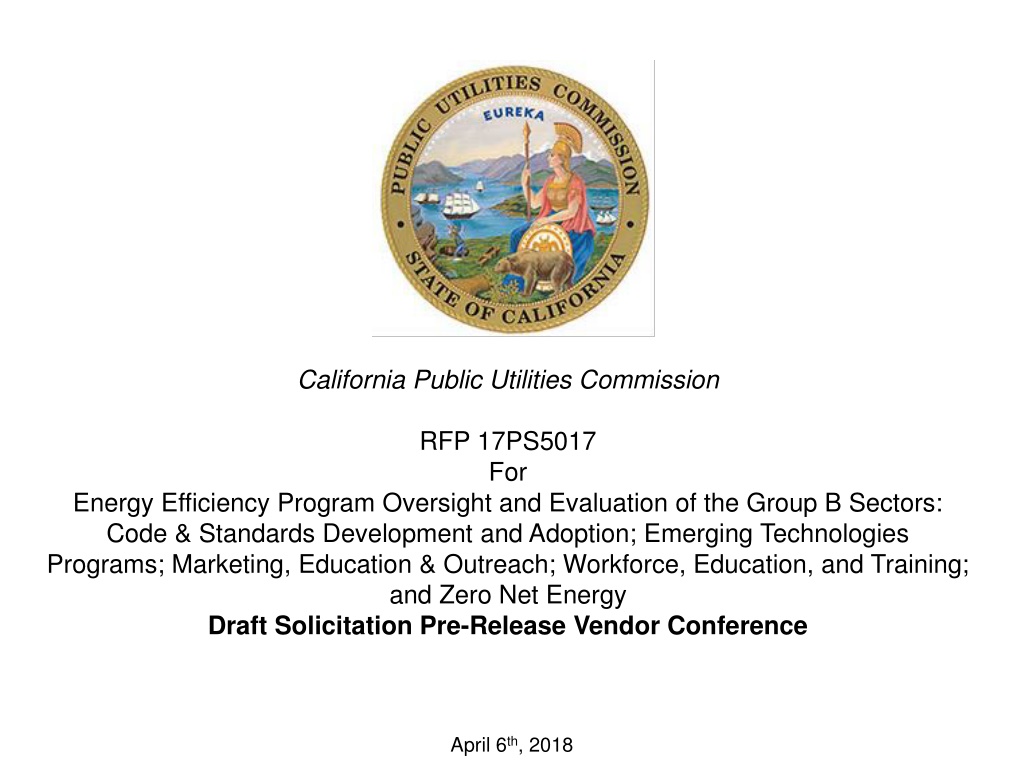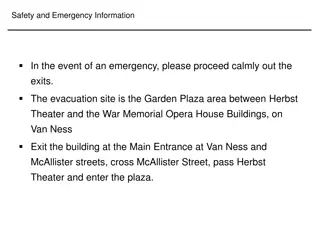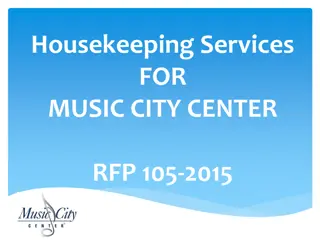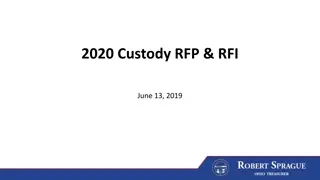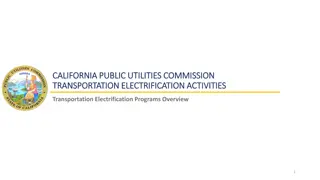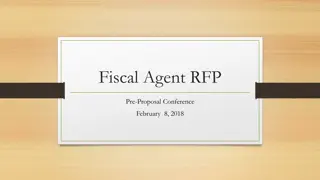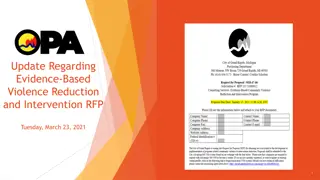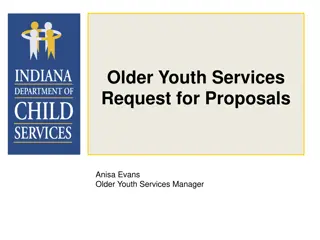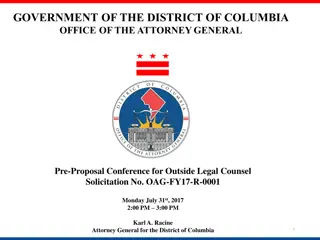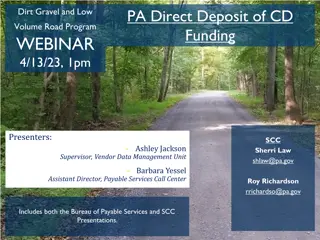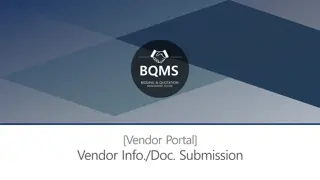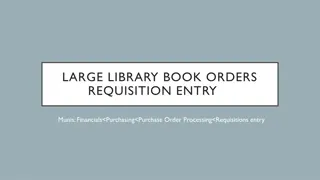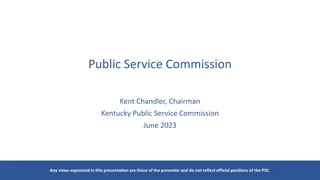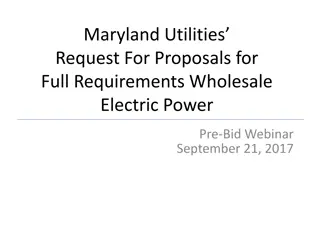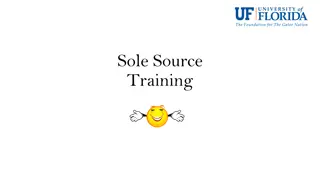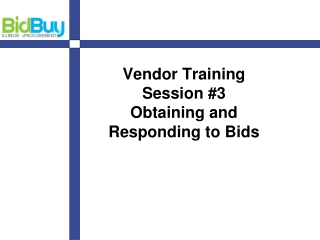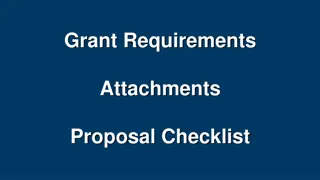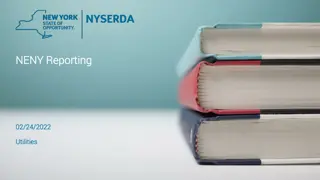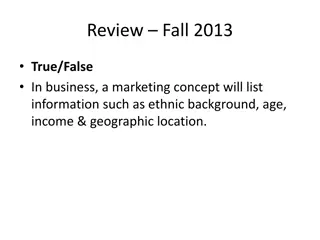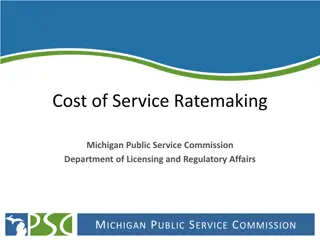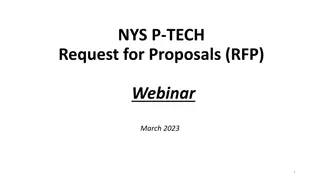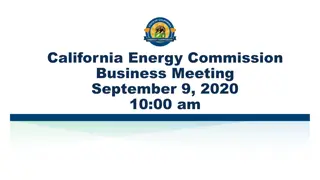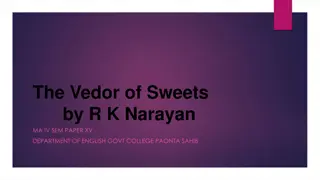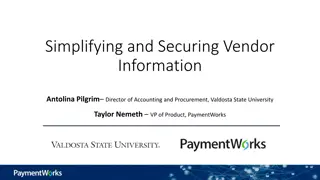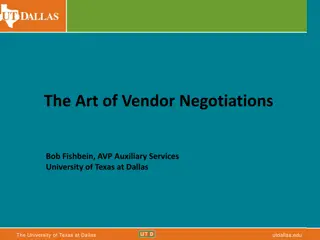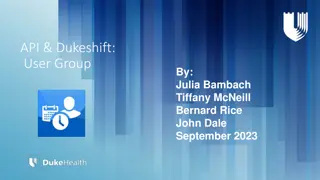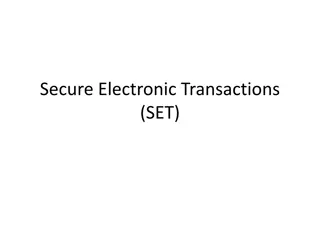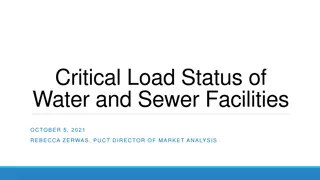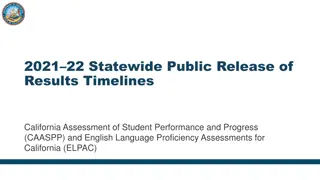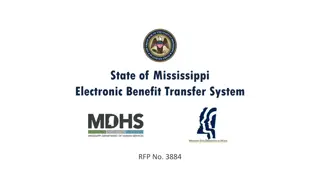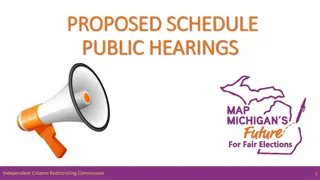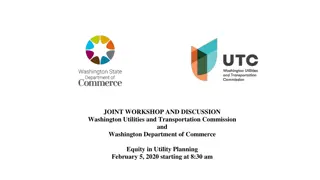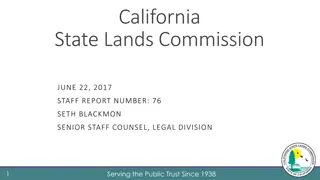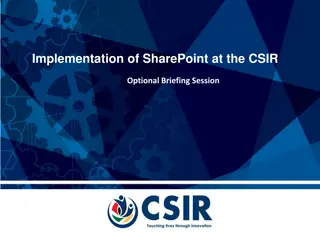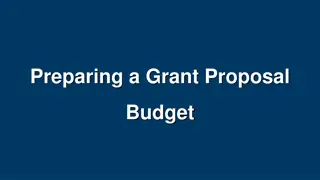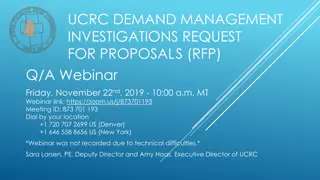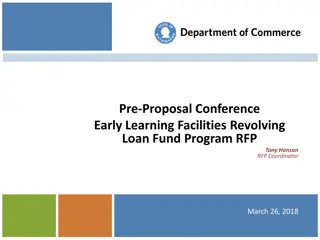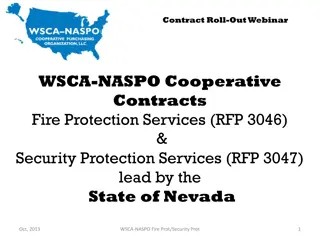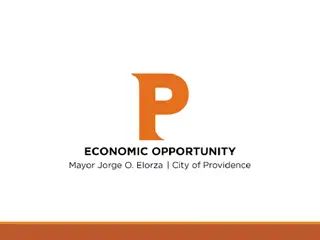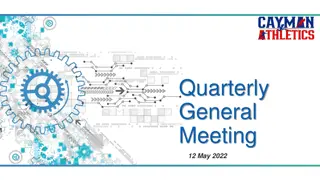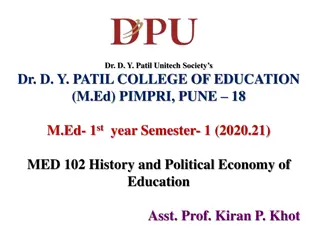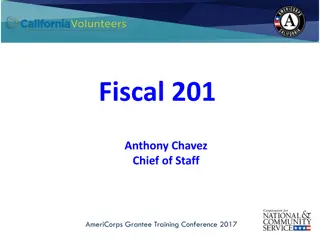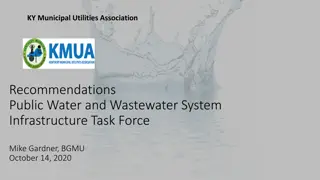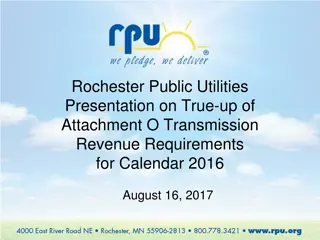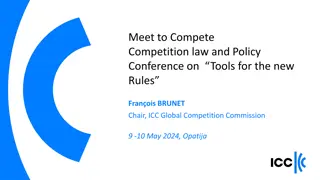California Public Utilities Commission RFP 17PS5017 Vendor Conference Overview
The California Public Utilities Commission held a pre-release vendor conference for the RFP 17PS5017 focused on Energy Efficiency Program Oversight and Evaluation. The conference agenda included presentations on procurement, EM&V program overview, qualification requirements, deliverable cost sheets, and a Q&A session. Protocols were outlined for the question and answer period to ensure a fair procurement process. Presenter Robert Hansen emphasized transparency and accountability in the CPUC's operations.
Download Presentation

Please find below an Image/Link to download the presentation.
The content on the website is provided AS IS for your information and personal use only. It may not be sold, licensed, or shared on other websites without obtaining consent from the author. Download presentation by click this link. If you encounter any issues during the download, it is possible that the publisher has removed the file from their server.
E N D
Presentation Transcript
California Public Utilities Commission RFP 17PS5017 For Energy Efficiency Program Oversight and Evaluation of the Group B Sectors: Code & Standards Development and Adoption; Emerging Technologies Programs; Marketing, Education & Outreach; Workforce, Education, and Training; and Zero Net Energy Draft Solicitation Pre-Release Vendor Conference April 6th, 2018
Safety and Emergency Information In the event of an emergency, please proceed calmly out the exits. The evacuation site is the Garden Plaza area between Herbst Theater and the War Memorial Opera House Buildings, on Van Ness Exit the building at the Main Entrance at Van Ness and McAllister streets, cross McAllister Street, pass Herbst Theater and enter the plaza.
4 Agenda 10:00 10:10 Welcome & Housekeeping Robert Hansen Energy Efficiency Branch, California Public Utilities Commission 10:10 10:20 Procurement Overview Michael Baltar, Contract Analyst California Public Utilities Commission 10:20 10:30 EM&V Program Overview Robert Hansen Energy Efficiency Branch, California Public Utilities Commission 10:30 11:00 Qualifications and Required Deliverables Group B Sector Leads Energy Efficiency Branch, California Public Utilities Commission 11:00 11:15 11:15 12:00 Deliverable Cost Sheet and Scoring Process Michael Baltar, Contract Analyst California Public Utilities Commission Questions & Answers All
Presenter: Robert Hansen 5 Housekeeping Throughout the procurement process from public comment until the contracts are awarded the CPUC will work to ensure all potential proposers have a level playing field and that the CPUC operates in a manner that is accountable to the public. The following protocols will be followed for the Question & Answers period: Out of respect for all participants, all questions will be held until the end of the conference in the time allotted for Q&A; Questions asked during this conference will be recorded; However, vendors should follow up in writing with all questions asked at this pre-release conference whether it was answered at the conference or not; Preliminary responses may be provided to questions verbally during this conference. However, no responses will be considered final or binding until they have been posted in writing; and CPUC is not bound by any elements of this draft RFP. Signing-in and verbally identifying yourself on the voicemail is optional. If you sign-in or identify yourself on the call, A list of those who participated in the conference will be public record.
6 Agenda 10:00 10:10 Welcome & Housekeeping Robert Hansen Energy Efficiency Branch, California Public Utilities Commission 10:10 10:20 Procurement Overview Michael Baltar, Contract Analyst California Public Utilities Commission 10:20 10:30 EM&V Program Overview Robert Hansen Energy Efficiency Branch, California Public Utilities Commission 10:30 11:00 Qualifications and Required Deliverables Group B Sector Leads Energy Efficiency Branch, California Public Utilities Commission 11:00 11:15 11:15 12:00 Deliverable Cost Sheet and Scoring Process Michael Baltar, Contract Analyst California Public Utilities Commission Questions & Answers All
Presenter: Michael Baltar 7 Procurement key dates Key Action Dates Date Pre-release Written Questions Submission Deadline 04/12/2018 5:00 PM PT RFP Release Date (Tentative) 04/20/2018 04/27/2018 Time TBA Optional Bidders Conference (Tentative) Location: CPUC 05/04/2018 5:00 PM PT Proposer s Written Questions Submission Deadline (Tentative) CPUC Written Answers Posting Date (Tentative) 05/11/2018 Intent to Bid Due Date (Tentative) 05/18/2018 5:00 PM PT Proposal Response Due Date (Tentative) 05/21/2018 4:00 PM PT Technical and Cost Evaluation (Tentative) May 22 May 30, 2018 Notice of Intent to Award (Tentative) 06/04/2018 Deadline to submit Intent to Protest (Tentative) 06/11/2018 5:00 PM PT Deadline to submit Protest Letter (Tentative) 06/15/2018 5:00 PM PT Contract Award Date (Tentative) 06/22/2018 Contract Execution Process (Tentative) 6/22/2018 7/02/2018
Presenter: Michael Baltar 8 Draft RFP pre-release questions and feedback must be submitted by 5 P.M. Pacific Time on April 12, 2018 This draft RFP pre-release is meant for CPUC to obtain feedback from stakeholders on how the documents can be improved to better illustrate CPUC s program needs. All feedback received will be taken into consideration, but may or may not be incorporated into the final RFP; Commenters are encouraged to consider the following overarching questions: What elements work? What elements could be improved? Are any important elements missing? Are instructions for Proposers clear? Comments shall refer to the specific page number and explain why a change is warranted, how the change would improve the solicitation, and how the change could increase competition. Questions submitted and feedback received during this pre-release period will not be posted as an official Q&A document. Any response and clarification from the CPUC will be directly incorporated into the final RFP, and all feedback received will be public record upon closing of the procurement. CPUC will not be able to take personal meetings or respond to telephone inquiries regarding the solicitations in order to ensure a level playing field, full transparency, and the integrity of the solicitations. All correspondence, questions, inquiries should be directed to Michael Baltar at Michael.Baltar@cpuc.ca.gov. No answers provided verbally shall be considered binding.
9 Agenda 10:00 10:10 Welcome & Housekeeping Robert Hansen Energy Efficiency Branch, California Public Utilities Commission 10:10 10:20 Procurement Overview Michael Baltar, Contract Analyst California Public Utilities Commission 10:20 10:30 EM&V Program Overview Robert Hansen Energy Efficiency Branch, California Public Utilities Commission 10:30 11:00 Qualifications and Required Deliverables Group B Sector Leads Energy Efficiency Branch, California Public Utilities Commission 11:00 11:15 11:15 12:00 Deliverable Cost Sheet and Scoring Process Michael Baltar, Contract Analyst California Public Utilities Commission Questions & Answers All
Presenter: Robert Hansen 10 The EM&V Program Consists of the Following Key Elements: Develop estimates for, and update the Commission s DEER database; review and approve workpapers Energy Savings Estimation Develop workplans and conduct market studies to inform programs, estimation and evaluation approaches Market Research Studies Measure and verify savings resulting from energy efficiency measures, programs and portfolios Impact Evaluations Seek and incorporate stakeholder feedback through public meetings, workshops and other Commission-approved processes Stakeholder Engagement
Presenter: Robert Hansen 11 The Contract Group B RFP Seeks Evaluation of the Following Research Sectors: Local Government Partnerships, CCAs, and RENs Codes and Standards Emerging Technologies Programs Marketing, Education & Outreach Workforce Education and Training Finance Programs Zero Net Energy
Presenter: Robert Hansen 12 The Contract Group B RFP Seeks Evaluation of the Following Research Sectors: Local Government Partnerships, CCAs, and RENs Codes and Standards Emerging Technologies Programs Marketing, Education & Outreach Supporting Research Activities Impact Evaluations Workforce Education and Training Finance Programs Zero Net Energy
Presenter: Robert Hansen 13 The Contract Group B RFP Seeks Evaluation of the Following Research Sectors: Local Government Partnerships, CCAs, and RENs Update and Maintain the Emerging Technologies Database Codes and Standards Emerging Technologies Programs Marketing, Education & Outreach Evaluate Programs and Pilot Workforce Education and Training Finance Programs Zero Net Energy
Presenter: Robert Hansen 14 The Contract Group B RFP Seeks Evaluation of the Following Research Sectors: Local Government Partnerships, CCAs, and RENs Evaluate Residential EE Loan Pilot Analyze data collected by CAEATFA Codes and Standards Emerging Technologies Programs Marketing, Education & Outreach Evaluate additional Finance Pilots as they are launched Workforce Education and Training Finance Programs Zero Net Energy
Presenter: Robert Hansen 15 The Contract Group B RFP Seeks Evaluation of the Following Research Sectors: Local Government Partnerships, CCAs, and RENs Codes and Standards Evaluate non-resource programs offered through LGPs, CCAs, and RENs Provide recommendations to improve long-term program success Emerging Technologies Programs Marketing, Education & Outreach Workforce Education and Training Finance Programs Zero Net Energy
Presenter: Robert Hansen 16 The Contract Group B RFP Seeks Evaluation of the Following Research Sectors: Local Government Partnerships, CCAs, and RENs Codes and Standards Assess market effectiveness of ME&O programs Evaluate and analyze ME&O Emerging Technologies Programs metrics per Business Plans Monitor and evaluate transition to Third Party Implementers Marketing, Education & Outreach Workforce Education and Training Finance Programs Zero Net Energy
Presenter: Robert Hansen 17 The Contract Group B RFP Seeks Evaluation of the Following Research Sectors: Local Government Partnerships, CCAs, and RENs Codes and Standards Study correlation between WE&T programs and installation quality Evaluate training partnerships Conduct process evaluations of career connections and workforce readiness programs Market study of workforce knowledge, skills, and abilities Emerging Technologies Programs Marketing, Education & Outreach Workforce Education and Training Finance Programs Zero Net Energy
Presenter: Robert Hansen 18 The Contract Group B RFP Seeks Evaluation of the Following Research Sectors: Local Government Partnerships, CCAs, and RENs Codes and Standards Emerging Technologies Programs Marketing, Education & Outreach Conduct Long-term case study Perform planning for Commercial ZNE policy Evaluate Cross-Cutting Programs Evaluate ZNE real estate management Analyze ZNE retrofit barriers Workforce Education and Training Finance Programs Zero Net Energy
19 Agenda 10:00 10:10 Welcome & Housekeeping Robert Hansen Energy Efficiency Branch, California Public Utilities Commission 10:10 10:20 Procurement Overview Michael Baltar, Contract Analyst California Public Utilities Commission 10:20 10:30 EM&V Program Overview Robert Hansen Energy Efficiency Branch, California Public Utilities Commission 10:30 11:00 Qualifications and Required Deliverables Group B Sector Leads Energy Efficiency Branch, California Public Utilities Commission 11:00 11:15 11:15 12:00 Deliverable Cost Sheet and Scoring Process Michael Baltar, Contract Analyst California Public Utilities Commission Questions & Answers All
Presenter: Michael Baltar 20 Proposers must meet the following Minimum Qualifications to be eligible to bid: Read and understand the Conflict of Interest provisions pertaining to the RFP, and has certified and signed the Conflict of Interest Statement in Attachment 2; Be registered as a private entity, non-profit organization, the University of California, California State University Foundation, or other governmental entities with the California Secretary of State or can provide an explanation as to why it is not necessary. Proposer must identify all subcontractors proposed for participation in the contract, and the tasks or work areas that would be assigned to each subcontractor using Attachment 5: Bidder Declaration. Certify and agree to the bidding and subcontracting limitations; A firm submitting a proposal as the Prime Contractor for Contract Group B may not be a subcontractor on any other proposing team for Contract Group B; A firm may submit proposals as the Prime Contractor for more than one contract group, but if a firm is awarded a contract as the Prime Contractor for one contract group, this precludes their eligibility as a Prime Contractor in any other contract groups under this set of Energy Efficiency Contracts; and A firm may be a subcontractor on multiple proposals for Contract Group B, so long as the firm is not participating as Prime Contractor on any of the Group B proposals.
Presenter: Michael Baltar 21 Proposers must meet the following Minimum Qualifications to be eligible to bid: If awarded the contract, sign a Confidentiality/Nondisclosure Statement for the use of data. Certify and agree to complete all deliverables in accordance to requirements described in the RFP and subject to the EDPM s approval and any Commission requirements. Certifies that they will adhere to theAmerican Evaluation Association s Guiding Principles for Evaluators. Complete and return the Notice of Intent to Bid (Attachment 19). Vendors who do not return this form by the date specified in Section 2.D: Key Dates will be disqualified from further participation.
Presenter: Robert Hansen 22 Proposers will be evaluated on the following desired qualifications: General Qualifications Demonstrate experience in successfully managing complex projects involving multidisciplinary teams comprised of: Multiple subcontractors, At least one senior experienced overall project manager, At least one manager for each sector and measure group, and In-house staff. Demonstrate that they can and will effectively manage time and resources across multiple projects, setting work plan schedule, and workflow. Proposals should include resumes for senior team members for each sector, including pertinent experience. Demonstrate experience among the proposal team in successfully conducting a program evaluation study and producing a high-quality report for use by the public, policy-makers, and program administrators. Stakeholder Communications Demonstrate experience in leading stakeholder workshops and engaging with stakeholders. Demonstrate experience working with stakeholders in a public regulatory process. Demonstrate experience in collecting and communicating data through various media, including graphs, charts, tables, and should demonstrate an understanding of the nature of data through quantitative analysis and qualitative interpretation. Regulatory Experience Demonstrate knowledge and understanding of California energy efficiency policy, Commission processes, and Commission proceedings. Demonstrate understanding of the current Cost Effectiveness requirements and tests applicable to California energy efficiency programs, and should demonstrate the ability to perform Cost Effectiveness Tests for resource programs.
Presenter: Robert Hansen 23 Proposers will be evaluated on the following desired qualifications: Evaluation Skills and Experience Demonstrate experience in the following energy programs evaluation related skills: Conducting in-depth program evaluation studies in a regulatory context; Designing and implementing sampling plans to inform statistically significant study results and findings. Developing and implementing complex study designs; Developing and conducting surveys through a variety of channels, e.g., telephone, internet, or physical surveys to address specific questions about a program; Designing and conducting Randomized Control Group studies to determine program influence and impacts; Collecting and organizing heterogeneous data from an array of sources; Conducting analysis of quantitative and qualitative energy program data (including energy savings estimates); Performing program evaluations and energy policy analysis that produces actionable recommendations for program decision-makers; Developing and providing specific feedback on energy efficiency methodologies for evaluation projects; Conducting energy and demand savings estimation; Measuring load/impact profiles, free ridership, measures effective and remaining useful life; and Developing net-to-gross values, gross realization rates, measures costs, estimation, and evaluation. Research Experience Demonstrate experience in conducting research projects on a variety of energy program topics including expertise in the multi-disciplined research areas of engineering, econometrics, behavioral and market research related to energy programs.
Presenter: Robert Hansen 24 Proposers will be evaluated on the following desired qualifications: Codes and Standards Related Experience Demonstrate familiarity with current industry building and appliance standards (Such as the California Title 20 and Title 24 standards), as well as current Federal appliance, equipment and lighting energy standards, and an understanding of the energy code development processes at the state and federal levels. Understand and be able to implement building certification methodologies. Local Government Partnerships, Community Choice Aggregators, and Regional Energy Networks Related Experience Demonstrate experience in conducting research projects on a variety of energy program topics including expertise in the multi-disciplined research areas of engineering, econometrics, behavioral and market research related to energy programs. Emerging Technologies Programs Related Experience Demonstrate knowledge of and experience working with current and emerging energy efficiency technologies, and demonstrate an ability to identify, evaluate, and commercial acceleration approaches and programs. Demonstrate knowledge of the industry standard process for inclusion of new technologies into the Energy Efficiency portfolio. Demonstrate knowledge of technology development processes, spanning early research and development to high levels of market penetration. Demonstrate experience, expertise, and knowledge working with energy-related market transformation approaches and programs.
Presenter: Robert Hansen 25 Proposers will be evaluated on the following desired qualifications: Finance Related Experience Demonstrate experience in evaluating statewide finance programs, and familiarity working with complex finance program-related datasets. Marketing, Education, and Outreach Related Experience Demonstrate familiarity with the strategies and goals of marketing, education, and outreach programs, and experience in evaluating marketing programs and campaigns. Workforce Education and Training Related Experience Demonstrate an understanding of all aspects of workforce education and training programs, and an ability to evaluate program performance based on different program goals. Zero Net Energy Related Experience Demonstrate knowledge of the concepts of Zero Net Energy and related terms and familiarity with current Zero Net Energy projects. Demonstrate experience in working with multiple stakeholders in developing strategic plans.
Presenter: Robert Hansen 26 Deliverables All Sectors (Page 1 of 2) Deliverables Description Create and establish research and evaluation workplans for each sector and market describing all tasks and activities necessary to complete all deliverables under this contract. 1. Research Sector Work plans 2. Progress Reports and Updates Submit monthly reports and provide updates on an as-needed basis. 3. Kickoff Meeting Attend kickoff meeting with the Commission upon award. 4. Standing Meetings Participate in monthly progress meetings with the Commission. 5. Stakeholder Workshops & Webinars Conduct at least 50 stakeholder engagement workshops or webinars. Be able to explain their evaluation approaches to a non-technical audience. 6. Gaps and Emerging Issues Report Submit a Gaps & Emerging Issues report by Nov 15th of each year for each sector. The contractor will cooperate with other prime contractors in collecting and analyzing data specific to the Contract Group B sectors, and coordinate with other Prime Contractors to update the Potentials and Goals report. 7. Potentials and Goals Study Coordination Conduct a dual data collection effort annually necessary to complete the review of savings estimates. Follow a stratified sampling methodology dictated by the tracking data available and other protocols determined by the Commission. Document any specifications and descriptions of the datasets throughout the life of this contract and provide all data collected to the contractors and to the Commission. 8. Data Collection, Transmission, and Storage Plan Develop recommendations for program administrators to improve their energy efficiency programs, including the analysis of program management and current overview of current energy efficiency programs. 9. Program Analysis and Recommendations
Presenter: Robert Hansen 27 Deliverables All Sectors (Page 2 of 2) Deliverables Description Deliver final evaluation reports to the Commission by March 1st of each year. The Commission Project Manager will determine which components of the final impact evaluation report will be submitted each year. At a minimum, the final report will include impact evaluations for the uncertain measures list each year under each sector in this contract group. 10. Draft and Final Impact Evaluation Reports Advise Commission Staff as needed, on matters concerning the Energy Efficiency Evaluation efforts and EM&V Research Roadmaps. 11. Subject Matter Expert Services Attend ad-hoc meetings with entities such as Commission Executives, Advisory Committee, and others, to provide updates, briefings, or participate in programmatic discussions. 12. Other Meetings and Briefings The State may add an additional amount in the contract for unanticipated tasks in the event that additional work must be performed that was wholly unanticipated, and which was identified in neither the State s solicitation document nor the Vendor s proposal, but which in the opinion of both parties is necessary to the successful accomplishment of the general scope of work. These tasks will be billed at a pre-approved proposed hourly rate, subject to the EDPM s approval, and are not to exceed 10% of the total agreement amount awarded. 13. Unanticipated Tasks
Presenter: Peter Biermayer 28 Deliverables Codes and Standards Program (Page 1 of 1) Deliverables Description Conduct impact evaluation of Codes and Standards programs, to ensure compliance with the Federal Standards and State building Standards per Title 20 and Title 24. In addition, the contractor shall complete the following analysis and assessment: Assessment of Overlapping Standards and To-Code Programs; Reasons for Non-compliance; Respond to Stakeholder Issues and Comments; Analyze Use of New Compliance Techniques; and Other additional reporting requirements. 14. Codes and Standards Impact Evaluation Continue work begun in the Review of the Process for Codes and Standards Program Cost-effectiveness reporting to resolve gaps in the assessment. 15. Refine the Cost Effectiveness Calculations for Codes and Standards Assess the need for, the possibility of, and the means for harmonizing the currently separate analyses for gross savings potential and code compliance. This analysis shall be conducted and completed within the first year of the evaluation cycle for codes and standards. 16. Gross Savings Potential and Compliance Analysis Harmonization Project
Presenter: Alexander Sasha Merigan 29 Deliverables Emerging Technologies Programs (Page 1 of 1) Deliverables Description Develop and maintain a website capable of housing the Emerging Technologies Program database, providing differing levels of access to stakeholders as specified by the Energy Division Project Manager for Emerging Technologies, including a splash page to give website visitors a one-glance snapshot of ETP activities. 17. Develop Emerging Technologies Database Content Evaluate the market uptake and achieved savings of all technologies and approaches that have moved from ETP into the IOU EE Portfolio or directly into codes or standards, including evaluation of historical savings of ETP-originated energy efficiency measures in the Program Administrators portfolios and codes and standards going back to 2009. 18. Emerging Technology to Portfolio Evaluation Study Evaluate the existing processes for passing technologies, approaches, and projects between technology development actors (such as EPIC, CalSEED, CalPlug, the 4 CA technology clusters), ETP, the IOU ET Incentive Portfolio, and Codes and Standards. 19. Emerging Technologies Handoff Evaluation Study Evaluate the Technology-Focused Pilots (TFP), which employs a roughly 2-year accelerated commercialization approach for high-priority high-potential technologies and approaches identified in the ETP Technology Priority Maps, and provide recommendations for program improvements. 20. Technology-focused Pilot Evaluation Study
Presenter: Kevin Feizi 30 Deliverables Finance Programs (Page 1 of 1) Deliverables Description Conduct an evaluation study of the Residential Energy Efficiency Loan (REEL) at the end of two-year pilot period to measure the degree to which the program was successful in reaching its goals based on metrics adopted in Resolution E 4900. After future financing pilots are launched by the California Alternative Energy and Advanced Transportation Financing Authority (CAEATFA), the Contractor will also conduct evaluation studies of those pilots at the end of their two-year periods. The data collection and analysis should at include, at minimum: 21. Evaluation of Finance- Related Pilots Data points collected by CAEATFA ; and Qualitative data generated through interviews with stakeholders including contractors, customers, and lenders.
Presenter: Robert Hansen and Nils Strindberg 31 Deliverables Local Government Partnerships (LGP), Community Choice Aggregators (CCA), Regional Energy Networks (RENs) (Page 1 of 1) Deliverables Description Support the Energy Division in tracking and analyzing of energy efficiency programs administered by current and any future Community Choice Aggregators (CCAs) Analyze benefits of non-resource programs, including reviewing and summarizing process evaluations, but any impact evaluation of resource programs will be evaluated under a separate Prime Contract. 22. Assessment of Community Choice Aggregators Support the Energy Division in tracking and analyzing the impacts and effectiveness of energy efficiency programs administered through local government partnerships (LGPs) and Regional Energy Networks (RENs). Analyze non-resource programs and how these programs provide benefits in terms of increased performance of contractors, greater customer awareness of programs and how to reduce energy consumption, etc., support non-resource programs provide to ongoing utility and REN resource programs and especially how they support program implementation and program delivery for resource programs. 23. Assessment of Local Government Partnerships and Regional Energy Networks
Presenter: Rory Cox 32 Deliverables Marketing, Education and Outreach Programs (Page 1 of 1) Deliverables Description Evaluate the energy efficiency Marketing, Education, and Outreach (ME&O) programs throughout the state, including Energy Upgrade California and the efforts of individual Program Administrators. The evaluation will focus on each program s effectiveness in leading consumers to take specific actions, including the following components: Effectiveness Assessment; and Collaborative Process Assessment. 24. Cross-Cutting Marketing Effectiveness Study Conduct a study to determine whether a consensus opinion exists on benchmarks related to ME&O metrics and success criteria in the energy efficiency industry, and what that consensus is. 25. Marketing Education and Outreach Consensus Evaluate how changes in the IOU Business Plans for ME&O will impact program delivery, and in particular how programs are marketed to residential and small businesses. 26. ME&O Program Transition from IOUs to Third Parties and CCAs
Presenter: Reese Rogers 33 Deliverables Workforce Education and Training (WE&T) Programs (Page 1 of 1) Deliverables Description Design and execute a study to understand whether and to what extent there is a causal link between IOU workforce training programs and improved installation practices. 27. WE&T and Installation Improvement Evaluation Design and execute a study to understand the functioning and impact of partnerships with WE&T training and job placement organizations, such as, but not limited to, community colleges, community-based organizations, workforce development boards, and apprenticeship programs. 28. Partnerships with Training Institutions Impact Evaluation Conduct a process evaluation on the WE&T Career Connections Program to investigate the following items: Evaluability and adaptability of the program; Effectiveness toward program goals and cost-effectiveness; Workforce outcomes for program participants; and Alignment with the identified Strategic Plan goals. 29. WE&T Career Connections Process Evaluation Conduct a process evaluation of the Career & Workforce Readiness program to investigate the following items: Evaluability and adaptability of the program; Effectiveness toward program goals and cost-effectiveness; Workforce outcomes for program participants; and Alignment with the identified Strategic Plan goals and best practices outlined in the Survey of Inclusion Workforce Landscape. 30. Career & Workforce Readiness Process Evaluation Conduct a study to identify the knowledge, skills, and abilities (KSA) needed for implementers, contractors, technicians, and contractor laborers on energy efficiency concepts. 31. Knowledge, Skills, and Abilities Market Studies
Presenter: Rory Cox 34 Deliverables Zero Net Energy (ZNE) Programs (Page 1 of 1) Deliverables Description Investigate study objectives in the context of the Newhall Ranch Development, including questions such as: How is the local utility planning for the unique attributes of this community on its grid?; and How is the developer defining Net Zero? 32. A ZNE Community Case Study Work with stakeholders to plan for the 2030 goals, developing plans and criteria to mainstream ZNE while taking into consideration ZNE buildings, communities, campuses, and portfolios. 33. Planning for a Commercial ZNE Policy Track and evaluate the cost effectiveness and the quality of IOU-led cross-cutting programs such as the California Advanced Homes Partnership, Savings by Design, and Public Sector ZNE programs, and how they integrate with other EE programs. Investigate the strengths and weaknesses of Community Choice Aggregators, and examine how they can contribute to ZNE goals. 34. IOU and CCA Cross- Cutting Program Evaluation Evaluate the common property management setups and owner-tenant relationships, and how they impact ZNE implementation and performance. 35. ZNE Commercial Real Estate Management Analyze the cost premiums associated with extending project timelines for retrofitting existing, occupied buildings, emphasizing commercial and industrial customers. 36. ZNE Retrofit Timelines and Costs
35 Agenda 10:00 10:10 Welcome & Housekeeping Robert Hansen Energy Efficiency Branch, California Public Utilities Commission 10:10 10:20 Procurement Overview Michael Baltar, Contract Analyst California Public Utilities Commission 10:20 10:30 EM&V Program Overview Robert Hansen Energy Efficiency Branch, California Public Utilities Commission 10:30 11:00 Qualifications and Required Deliverables Group B Sector Leads Energy Efficiency Branch, California Public Utilities Commission 11:00 11:15 11:15 12:00 Deliverable Cost Sheet and Scoring Process Michael Baltar, Contract Analyst California Public Utilities Commission Questions & Answers All
Presenter: Michael Baltar 36 Proposers shall taken into consideration the following instructions when filling out the Deliverables Cost Sheet in Attachment 10 Cost Evaluation For this RFP, the Proposers will be evaluated on the proposed Total Evaluation Cost to ensure fair competition and allow an apples-to-apples comparison.Proposers shall include all authorized costs to perform the scope of work and state the total dollar amounts for each deliverable line item using the template provided in the solicitation. The awarded contractor will work with the EDPM upon contract execution to determine the final total contract cost. Number of Units The Commission will provide the number of units required for each deliverable for planning and/or evaluation purposes. The actual number of units may vary upon contract execution based on program needs from year to year, and based on the EDPM s approval. Milestone Deliverables Milestone deliverables under this contract can be defined as a periodic and/or progressive set of sub-deliverables throughout the contract period. For example, a milestone deliverable for Deliverable 2: Progress Reports and Updates could be one monthly report. Total cost per unit identified in this RFP cannot be modified throughout the contract period. However, milestone deliverables can be determined upon contract execution between the Contractor and the EDPM can propose modification to any milestone deliverable and its price point, subject to the EDPM s approval. Calculation For Option Years Upon contract award, total cost per unit submitted by the awarded contractor are fixed for the life of the contract. For option years, these costs will be adjusted by the Commission-defined, CPI-based escalation rate as applicable. EDPM will determine the number of units required for each deliverable for each option year. Not all deliverables may be needed if an option year is exercised.
Presenter: Michael Baltar 37 Proposers will fill out all tabs within the Deliverables Cost Sheet in Attachment 10 to detail cost for each requested deliverable Tabs Description Proposers will enter the name, title, hourly rate, and areas of expertise for all Proposer's key team members. Proposer can add or subtract lines as necessary. Proposer can refer to Tab "Hourly Rates" for a list of CPUC classifications. Team Members This is a list of positions equivalent to CPUC classifications. Proposers will enter the hourly rate of team members equivalent to the listed CPUC classification. This tab is primarily used to calculate the cost for Deliverable 18: Subject Matter Expert Services. Hourly Rates Proposer will fill out Column C Column N to reflect the Total Cost Per Unit in order to calculate Evaluation Cost for all deliverables. The total evaluation cost is calculated for evaluation purposes only, the final contract amount may be adjusted based on level of rigor used and number of units required. Deliverables This section will be automatically populated upon completion of the previous tabs. The total Evaluation Cost is calculated for evaluation purposes only, the final contract amount may be adjusted based on deliverable approach/rigor level upon contract execution. Both the Total Evaluation Cost and the Final Contract Amount must not exceed the contract cost cap of $16.5 million. Total Contract Cost
Presenter: Michael Baltar 38 The contract will be awarded to the proposer whose proposal received the highest score by the CPUC evaluation and selection team Stage Scoring Description All proposals that pass the compliance check will begin Stage 1: Technical Review. The Review Panel will review all proposals to assess the Proposer s ability to carry out the proposed work. The Review Panel will review each proposal individually and then score by consensus all aspects of the following requirements: Proposer s Team Description and Experience (220 points); - Organization Description; and - Desired Qualifications. Approach and Workplan (470 points). - Workplan Narrative; and - Detailed Workplan. Stage 1: Technical Review 690 Points Proposers must obtain a minimum of 448 points in Stage 2 in order to advance to Stage 2. For proposals that passed Stage 1, all references will be contacted for this stage. CPUC will make reasonable attempts at contacting the references, and scores received from respondents will be averaged out for the final score of that element. Stage 2 : Reference Check 40 Points Each proposer s total cost for all services will be ranked from low-to-high. The proposal with the lowest total cost will received a score of 300. The remaining proposals will receive an incrementally lower score as indicated in the sample calculation in the solicitation. 300 Points Stage 3 : Cost Evaluation Stage 4: Adjustments for SB/DVBE Participation N.A. Scores will be adjusted to account for SB and/or DVBE participation. CPUC will combine the points of each qualifying Proposer from Stage 1-4 to calculate the total score for each qualifying Proposer. The maximum point value for Stage 1-3 is 1030 points, prior to SB/DVBE adjustment. Stage 5: Combining Scores N.A.
39 Agenda 10:00 10:10 Welcome & Housekeeping Robert Hansen Energy Efficiency Branch, California Public Utilities Commission 10:10 10:20 Procurement Overview Michael Baltar, Contract Analyst California Public Utilities Commission 10:20 10:30 EM&V Program Overview Robert Hansen Energy Efficiency Branch, California Public Utilities Commission 10:30 11:00 Qualifications and Required Deliverables Group B Sector Leads Energy Efficiency Branch, California Public Utilities Commission 11:00 11:15 11:15 12:00 Deliverable Cost Sheet and Scoring Process Michael Baltar, Contract Analyst California Public Utilities Commission Questions & Answers All
Presenter: Robert Hansen 40 Questions & Answers Though CPUC may give oral responses during this session, no answers provided verbally shall be considered binding. Questions asked during this conference will be recorded; However, vendors should follow up in writing with all questions asked at this pre-release conference whether it was answered at the conference or not. CPUC is not bound by any elements of this draft RFP.
41 Thank You for Participating! All Questions and comments shall be submitted to Michael Baltar at Michael.Baltar@cpuc.ca.gov
